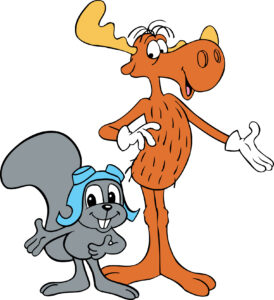 The generation before mine had the Looney Tunes, the one behind, The Simpsons; two thick-beneath-the-surface icebergs of pop satire that taught kids to laugh at the very world that threatened to destroy them; a patchwork quilt of warring cultures, isms and ideologies whose dead-serious leaders often looked, talked and acted, well...cartoonish.
The generation before mine had the Looney Tunes, the one behind, The Simpsons; two thick-beneath-the-surface icebergs of pop satire that taught kids to laugh at the very world that threatened to destroy them; a patchwork quilt of warring cultures, isms and ideologies whose dead-serious leaders often looked, talked and acted, well...cartoonish.
Any while my generation didn’t have a Hitler or ISIS in bed with it every night as it turned out the lights, we had something far more terrifying; the looming specter of all-out nuclear holocaust. For that reason, of all the things we Boomers had in our duck-and-cover years, none may have been any more sanity-preserving than a low-budget and crudely drawn Saturday morning cartoon.
And what we learned from that animated slice of heaven was this: in life it is important to be able to detect bullshit, yes. But it is just as important to be able to laugh at it.
For that, we post-war babies owe thanks to the oddest of couples; a wide-eyed and hopelessly naïve flying squirrel and his well-intentioned but slow-on-the-draw sidekick. The Adventures of Rocky and Bullwinkle was absurdist drama just for us; theater of the absurd dressed, like we were, in its Saturday morning PJs.
Who needed Ionesco or Beckett? We had Jay Ward and Bill Scott.
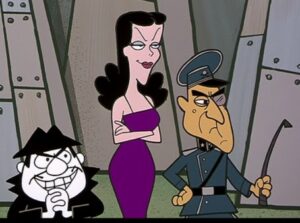 Wait for Godot? Why the hell should we? We had Fearless Leader, mooseberry rocket fuel, and giant robotic mice as looming, foreboding (and largely offstage) presences trying to distract us from one truth laid bare each week by that big, dopey moose and his little buddy; that behind the curtain was an evil wizard who farted, picked his nose and had morning breath, just like we did.
Wait for Godot? Why the hell should we? We had Fearless Leader, mooseberry rocket fuel, and giant robotic mice as looming, foreboding (and largely offstage) presences trying to distract us from one truth laid bare each week by that big, dopey moose and his little buddy; that behind the curtain was an evil wizard who farted, picked his nose and had morning breath, just like we did.
Thanks to its topical, daring and weekly send-ups, the Adventures of Rocky and Bullwinkle (fueled by William Conrad’s delicious mock-serious narration) almost overnight turned the Cold War into something manageable, if not laughable. And, as a result, we were able view once-terrifying things like air raid drills, mushroom clouds, and bomb shelters the same way we saw that old guy down the street who washed his car too frequently or got a little too anal about weeds in his lawn. They were suddenly harmless byproducts of men worthy not of our fear, but our snickers.
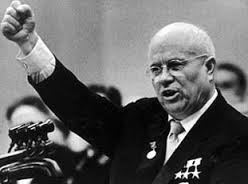 What’s more, thanks to Rocky and Bullwinkle, whenever we saw Khrushchev on Walter Cronkite he was no longer the chilling face of the Cuban Missile Crisis or the crazed Soviet who pounded his shoe and vowed to destroy us. Overnight, he became a cartoon. He was Boris Badenov, all small in stature and drowning in bluster. And that not-so-subtle shift in perception allowed us to cope, and shaped us in ways that, even today, I’m not sure we fully appreciate.
What’s more, thanks to Rocky and Bullwinkle, whenever we saw Khrushchev on Walter Cronkite he was no longer the chilling face of the Cuban Missile Crisis or the crazed Soviet who pounded his shoe and vowed to destroy us. Overnight, he became a cartoon. He was Boris Badenov, all small in stature and drowning in bluster. And that not-so-subtle shift in perception allowed us to cope, and shaped us in ways that, even today, I’m not sure we fully appreciate.
In fact, while I can’t speak for everyone my age, there were many life-changing things I learned from Rocket J. Squirrel and Bullwinkle J. Moose. I learned, for example, that while evil may exist, it is simply no match for deep faith, unblinking honesty and always trying to do the right thing. But mostly I learned that, when in doubt, it is always best to question authority and chuckle at small-mindedness.
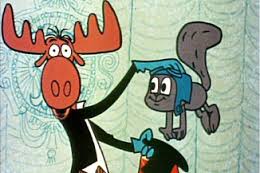 Alas, the Adventures of Rocky and Bullwinkle never made a clean transition to digital, as over the years legal wrangling, rights issues and, it would seem, good old-fashioned greed led to any number of compilations that altered the show’s original format and content. But that hardly matters, because like the finest and most impactful topical humor – think All in the Family, Mort Sahl or the Daily Show with Jon Stewart – its true power had to have been felt during the era it existed, lampooned, and in a very real way, helped shape.
Alas, the Adventures of Rocky and Bullwinkle never made a clean transition to digital, as over the years legal wrangling, rights issues and, it would seem, good old-fashioned greed led to any number of compilations that altered the show’s original format and content. But that hardly matters, because like the finest and most impactful topical humor – think All in the Family, Mort Sahl or the Daily Show with Jon Stewart – its true power had to have been felt during the era it existed, lampooned, and in a very real way, helped shape.
The Looney Tunes and the Simpsons were never my generation’s cartoon shows, and never will be. That’s why, while we Boomers can love them on an intellectual level, and marvel at their wit, timing and humor, they can never go to a place that that little squirrel and that big, dumb moose once went.
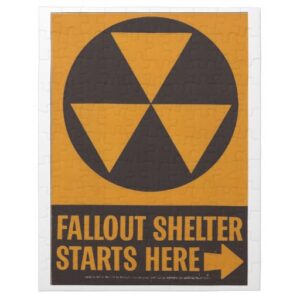 Because it was Rocky and Bullwinkle who were by our side at the height of the Cold War, and who were there in bed with us each night as the lights went out.
Because it was Rocky and Bullwinkle who were by our side at the height of the Cold War, and who were there in bed with us each night as the lights went out.
It was Rocky and Bullwinkle who demystified the cryptic and often-chilling language of our bomb-shelter days.
But more than anything, it was Rocky and Bullwinkle who taught us never to be afraid of the Boogieman, or even our own mortality. Because, in teaching us that, they also taught us that our most powerful weapon against such things is, was, and will remain forever, our ability to look them straight in the eye and laugh.
Rocky: Bullwinkle, do you know what an A-Bomb is?
Bullwinkle: Sure, a bomb is what some people call our show.
Rocky: I don't think that's very funny.
Bullwinkle: Neither do they, apparently.

That is so RIGHT ON, to use a phrase that would sound ridiculous today. I remember coming home from having my tonsils taken out ( yes they used to do that) to the premier show.
Of course we would have fallout practice or some stupid thing where at school we would go in the hall and put our head between our legs. ( sure fire way to freak kids out AND to prevent Atomic bomb damage.
Love this article
Thanks, Scott. Remember: you see that flash of light, get under your desk right away. You'll be safe there.
I loved this show. Remember the search for the Kerwood Derby? A joke only a boomer would get.
Loved the Kerwood Derby. And not only would it require a boomer to get the joke/pun, but a boomer of a certain age. I'd say old Derwood's 15 minutes were, literally, 15 minutes.